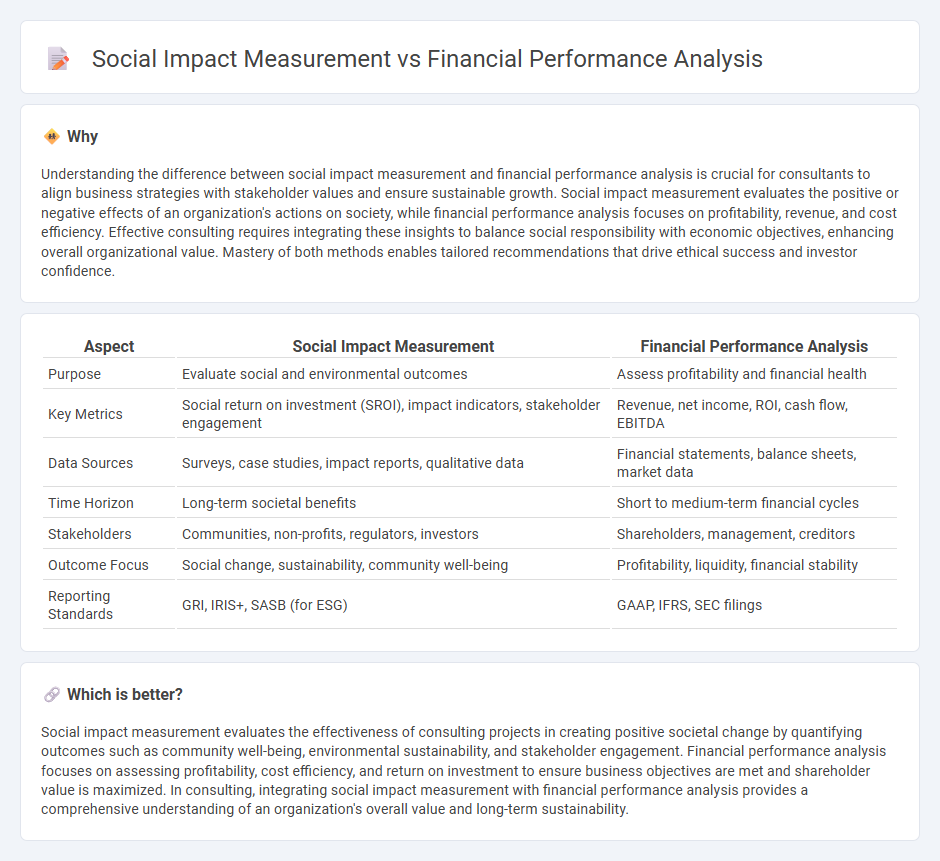
Consulting in social impact measurement focuses on evaluating the positive outcomes and societal value generated by programs and initiatives, using metrics such as Social Return on Investment (SROI) and impact assessment frameworks. Financial performance analysis, on the other hand, concentrates on assessing an organization's profitability, liquidity, and operational efficiency through key indicators like ROI, EBITDA, and cash flow analysis. Explore how integrating these approaches can drive both social and financial success.
Why it is important
Understanding the difference between social impact measurement and financial performance analysis is crucial for consultants to align business strategies with stakeholder values and ensure sustainable growth. Social impact measurement evaluates the positive or negative effects of an organization's actions on society, while financial performance analysis focuses on profitability, revenue, and cost efficiency. Effective consulting requires integrating these insights to balance social responsibility with economic objectives, enhancing overall organizational value. Mastery of both methods enables tailored recommendations that drive ethical success and investor confidence.
Comparison Table
| Aspect | Social Impact Measurement | Financial Performance Analysis |
|---|---|---|
| Purpose | Evaluate social and environmental outcomes | Assess profitability and financial health |
| Key Metrics | Social return on investment (SROI), impact indicators, stakeholder engagement | Revenue, net income, ROI, cash flow, EBITDA |
| Data Sources | Surveys, case studies, impact reports, qualitative data | Financial statements, balance sheets, market data |
| Time Horizon | Long-term societal benefits | Short to medium-term financial cycles |
| Stakeholders | Communities, non-profits, regulators, investors | Shareholders, management, creditors |
| Outcome Focus | Social change, sustainability, community well-being | Profitability, liquidity, financial stability |
| Reporting Standards | GRI, IRIS+, SASB (for ESG) | GAAP, IFRS, SEC filings |
Which is better?
Social impact measurement evaluates the effectiveness of consulting projects in creating positive societal change by quantifying outcomes such as community well-being, environmental sustainability, and stakeholder engagement. Financial performance analysis focuses on assessing profitability, cost efficiency, and return on investment to ensure business objectives are met and shareholder value is maximized. In consulting, integrating social impact measurement with financial performance analysis provides a comprehensive understanding of an organization's overall value and long-term sustainability.
Connection
Social impact measurement provides quantitative and qualitative data on a company's societal contributions, which in turn influences financial performance analysis by highlighting intangible assets and long-term value creation. Integrating social impact metrics into financial analysis enables consultants to assess risk, enhance stakeholder trust, and identify sustainable growth opportunities. This connection drives more holistic decision-making frameworks that balance profitability with social responsibility.
Key Terms
ROI (Return on Investment)
Financial performance analysis quantifies ROI through metrics such as net profit, ROI ratio, and cash flow to assess economic value creation. Social impact measurement evaluates ROI by analyzing social outcomes, community benefits, and environmental sustainability, emphasizing value beyond monetary returns. Explore frameworks to balance these approaches for comprehensive ROI insights.
Triple Bottom Line
Financial performance analysis evaluates profitability, revenue growth, and cost efficiency over specific periods, emphasizing economic value creation. Social impact measurement assesses environmental sustainability, social equity, and community engagement, aligning closely with the Triple Bottom Line framework of People, Planet, and Profit. Discover how integrating these metrics drives comprehensive corporate responsibility and sustainable growth strategies.
SROI (Social Return on Investment)
Financial performance analysis measures profitability, efficiency, and return on investment through quantitative metrics like ROI, earnings, and cash flow. Social impact measurement, particularly SROI (Social Return on Investment), evaluates the broader value created by an organization, incorporating social, environmental, and economic outcomes to quantify impact using stakeholder-defined indicators. Discover how integrating financial and social metrics can enhance decision-making and demonstrate holistic value creation.
Source and External Links
How to Evaluate the Financial Performance of a Company - Financial performance analysis involves examining multiple financial metrics from income statements, balance sheets, and cash flow statements together, benchmarking against past periods and industry to understand a company's financial health comprehensively.
What is Financial Performance Analysis? - DOKKA - It is a systematic review of a company's financial health over a period through income statement analysis (profitability), balance sheet analysis (liquidity, solvency), and cash flow statement analysis (cash management).
Financial Performance Tips: 14 Metrics to Measure, Analyze ... - Ramp - Key financial performance metrics include net profit margin, cash flow, current ratio, and other ratios that assess profitability, liquidity, and efficiency to guide strategic decisions.
 dowidth.com
dowidth.com